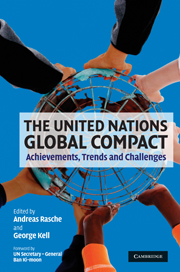Book contents
- Frontmatter
- Contents
- List of figures
- List of tables
- List of boxes
- List of abbreviations
- List of contributors
- Acknowledgements
- Foreword
- Why This Book Matters!
- The Ten Principles of the United Nations Global Compact
- 1 Introduction: the United Nations Global Compact – retrospect and prospect
- Part I Achievements, trends and challenges: reflections on the Principles
- Part II Participants and engagement mechanisms
- Part III Governance and Communication on Progress
- 14 The United Nations Global Compact's governance framework and integrity measures
- 15 The United Nations Global Compact Communication on Progress policy: origins, trends and challenges
- 16 COP reporting in action: the case of Petrobras
- 17 The United Nations Global Compact and the Global Reporting Initiative
- Part IV Local Networks: the emerging global–local link
- Glossary
- Bibliography
- Index
15 - The United Nations Global Compact Communication on Progress policy: origins, trends and challenges
Published online by Cambridge University Press: 05 February 2012
- Frontmatter
- Contents
- List of figures
- List of tables
- List of boxes
- List of abbreviations
- List of contributors
- Acknowledgements
- Foreword
- Why This Book Matters!
- The Ten Principles of the United Nations Global Compact
- 1 Introduction: the United Nations Global Compact – retrospect and prospect
- Part I Achievements, trends and challenges: reflections on the Principles
- Part II Participants and engagement mechanisms
- Part III Governance and Communication on Progress
- 14 The United Nations Global Compact's governance framework and integrity measures
- 15 The United Nations Global Compact Communication on Progress policy: origins, trends and challenges
- 16 COP reporting in action: the case of Petrobras
- 17 The United Nations Global Compact and the Global Reporting Initiative
- Part IV Local Networks: the emerging global–local link
- Glossary
- Bibliography
- Index
Summary
Introduction
The Communication on Progress (COP) requirement was introduced in 2003 and has, since then, become the most important integrity measure of the Global Compact. It obligates all business participants to publicly report on the progress they have made in implementing their commitments to the twin goals of the Global Compact, embracing and enacting the ten Principles and undertaking projects in the pursuit of wider UN goals (see box 15.1). Many observers see the COP as an effective mechanism of public disclosure that holds companies accountable regarding their commitment to the Global Compact; others criticize the same COP for being too flexible a model, vague and lacking rigour. This chapter aims to set out the rationale for the need to have a public disclosure requirement, its assumptions and limitations, how the policy has evolved over time, trends in COP reporting and finally what the current challenges are, and how they can be overcome.
Need for accountability and transparency: origins and rationale
From its inception, the Global Compact was criticized for being a voluntary initiative with no binding rules or accountability. Allegations ranged from ‘bluewashing’ – that is to say, using the blue from the UN brand to create a positive spin, to cover over the real issues – to preempting more rigorous normative regulations on companies' responsibilities in a globalized economy: in short, there was widespread scepticism.
- Type
- Chapter
- Information
- The United Nations Global CompactAchievements, Trends and Challenges, pp. 265 - 280Publisher: Cambridge University PressPrint publication year: 2010
- 11
- Cited by



